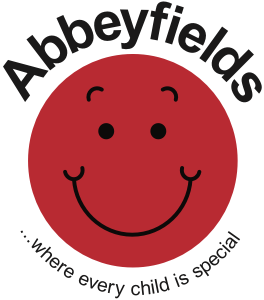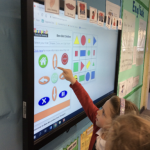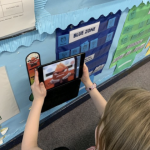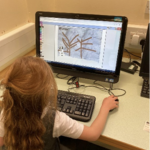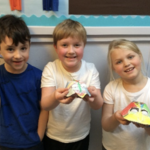“Computing is not about computers anymore. It is about living.”
Nicholas Negroponte
“The digital revolution is far more significant than the invention of writing or even of printing.”
Douglas Engalbart
Computing Subject Leader: Mrs Wendy Heide
Please note the long term plan is currently under review.
Abbeyfields Curriculum Driver – Computing
E-safety Policy
Computing Long Term Plan
At Abbeyfields we aim to provide a high-quality computing education, which equips pupils to use computational language and thinking, as well as their own creativity, to understand and change the world.
Children attending our school have a wide range of prior knowledge in relation to using technology. We plan for this by providing our children with a range of technologies to use and explore from their very earliest days with us in Nursery. We recognise that computing and technology is not just about computers and therefore quickly establish the needs of cohorts and individuals in order to adjust our planning appropriately.
Children in our Early Years Foundation Stage (EYFS) are able to demonstrate their independence in using the choice of technology on offer and are encouraged to choose the appropriate equipment for specific purposes. We aim to teach them about how to use a range of equipment safely, planning experiences beyond the EYFS Framework.
The computing curriculum in Key Stage 1 (KS1) and Key Stage 2 (KS2) is divided into three main strands and is designed in school to build upon the skills already established in EYFS:
- E-safety (Digital Literacy)
- Information technology
- Computer science (Programming)
Lessons focus on the progression of:
- key vocabulary
- key skills
- use of applications
E-Safety at Abbeyfields
The internet is a brilliant place for learning, speaking to friends and family, and playing games. However, it is very important to understand how to use it safely and how to deal with any problems you may come across. Staying safe when using the internet and other new technologies is known as e-safety. Digital literacy is key to our teaching of computing as it teaches the importance of staying safe online and how children do this.
The key to the school’s safeguarding policy is having a robust e-safety curriculum in place. As a result, we embed the teaching of e-safety throughout the whole curriculum and actively encourage children to practise being safe online. As part of our e-safety teaching, we have a half termly dedicated lesson on an aspect of online safety and this message will be incorporated into everyday teaching and our whole school ethos. Parents and carers are regularly provided with support and information about how to keep their child safe online in the school newsletter and via X (Twitter)
Alongside half termly lessons, e-safety is also embedded in the weekly teaching of our Abbeyfields Computing curriculum. For example, in the Year 2 unit on Digital Photography, the children are given the opportunity to discuss the importance of asking permission to take digital photos before considering how to make use of these images.
These themes are revisited on Internet Safety Day where children are given the opportunity to explore various themes relating to keeping safe online. Safer Internet Day is celebrated globally in February each year and is designed to promote the safe and positive use of computing.
Children are actively encouraged to come forward if they think they have come across anything unsuitable online. Please look carefully at any newsletters sent home for any updates in communications that the school has received regarding e-safety. The school’s safeguarding team (Designated Safeguarding Leads) also ensure their online safety knowledge is up to date through training and when issues do arise, they are dealt with quickly. Our Computing Lead is a trained CEOP Ambassador and a member of the staff safeguarding team as DSL overseeing online safety.
If you have any queries about an aspect of e-safety please contact the Computing Lead, Mrs Heide, via the school office.
We stress that the school must work in partnership with parents around this area and welcome any information that you may have in order to keep all children safe online. Newsletters will include any updates in communications that school has received regarding e-safety.
Programming at Abbeyfields
- Children will be taught what an algorithm is and program this into a floor robot. They will make predictions about where their robot will end and debug if there is any error in their code.
- Children will use a variety of floor robots including codeapillar, Beebots and Clementoni Doc.
Information Technology at Abbeyfields
- Children will use technology to organise and present their ideas through word processing tools and the internet. They will use cameras to take still and moving images and use these to produce simple animations. They will use the internet to search safely to find out information about each half termly topic.
How do we ensure progression of knowledge and skills?
Using the National Curriculum, the Teach Computing curriculum, Barefoot Computing and the expertise of our National Computing Centre for Education Subject Matter Expert consultant, who has worked alongside our Computing Subject Leader, we have developed and created a bespoke curriculum for Abbeyfields. Our Subject Matter Expert worked with the school to create an action plan to improve and promote the delivery of a quality Computing Curriculum. This has resulted in a knowledge and skills progression document, which is used for planning, to ensure sequenced and appropriate content for specific year groups, as well as a build up of knowledge and skills. Within our planning there are opportunities for differentiation, in order to meet the needs of all learners.
How is the computing curriculum taught at Abbeyfields?
Our long term plan maps out the coverage of the discrete teaching and learning opportunities for children to use technology.
Within each discrete block of teaching, class teachers carefully plan the specific outcomes for their year group, based upon age appropriate knowledge and skills that are expected.
Our teaching and learning opportunities ensure all children are introduced to and reminded of key vocabulary. In computing, the understanding of key phrases, terms and words allows pupils to become digitally literate – able to use, and express themselves and develop their ideas through information and communication technology.
Questioning is used to check understanding and prior knowledge, before new concepts are introduced. Modelling is used by class teachers to clarify expectations, children are then given plentiful opportunities to consolidate, build upon and apply basic skills in order to produce a piece of work which showcases what they have learnt.
When children are learning about a subject through discrete teaching sessions they are reminded of the key skills that they will learn, use and develop within that subject.
In Computing these are to:
- use the internet safely
- understand the different uses of technology
- give instructions to make things happen
- predict simple patterns
- solve simple problems
In addition to discrete teaching in this subject, opportunities through other areas of the curriculum enables children to practise their skills and knowledge throughout the year.
How do we know that our children are making progress?
Ongoing assessments of the children’s knowledge and skills are observed by the class teacher. Misconceptions are addressed and next steps carefully planned. Children’s outcomes are compared to the subject specific skills and knowledge documents. At the end of a block of discrete teaching (or term) subject leaders gather an overview of children’s outcomes in each subject area. This is used to plan appropriate next steps for their future learning, as well as provide an overview of learning within a subject area across the whole school.
Our curriculum drivers are central to our curriculum. How do we promote reading, vocabulary acquisition, holistic education and diversity?
The Abbeyfields computing curriculum allows our children to learn how to use technology safely and opens up opportunities for our children to discover the wider world. Within the computing curriculum, children develop the technical language needed, work collaboratively on joint projects or when solving problems and express their own creativity by making choices. Our pupils gain an understanding of the use of information technology in our daily lives.
They learn how to protect their own wellbeing both now and in the future by knowing how to stay safe online.
Our pupils will be given the opportunity to engage with STEM ambassadors who will visit the school and allow children to understand the real world applications of their learning through showcasing different roles and pathways into industry and further education. Children will experience an awareness of how skills in technology can transfer to future careers. Pupils will meet a range of inspiring role models who will challenge stereotypes and allow children to raise aspirations.
